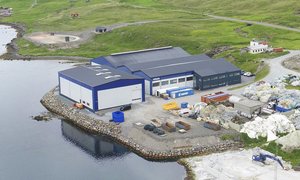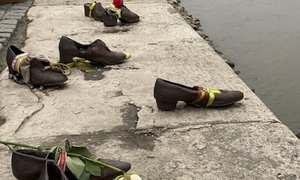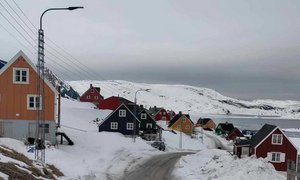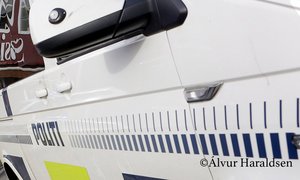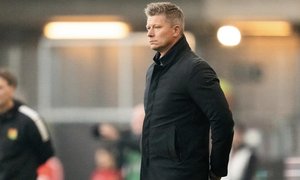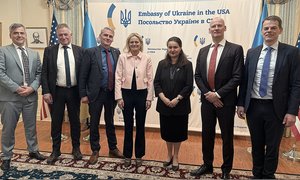The invisible islands
A small group of islands situated on the Northern fringe of Europe, the Faroes, to be sure, occupy no prominent position in the world. Indeed, this bleak, windswept archipelago may sometimes seem almost invisible. Nevertheless, the development of this small community within the cultural and geographical ambience of the North Atlantic may be not quite without interest.
Historically, together with six other North Atlantic islands and island groups, the Faroes were, in the Middle Ages, dependencies or tax lands of the Kingdom of Norway. However, while Shetland and the Orkneys fell under the harsh dominion of the Scots, the Faroes eventually passed from Norway to be governed for centuries, at an agreeable distance, by the more easy-going Danes.
Thanks chiefly to this single fact we were able to preserve our language, which is, incidentally, like Icelandic a direct descendant of the language of the Vikings. In possession of a language, a history and a cultural identity, the Faroese were, in the twentieth century, in a position to develop a modern culture. Consequently, we are now endeavouring, by way of a pragmatic, non-dramatic process, to gain full economic and political independence.
But first, we shall all hold our breath. On Monday the first of October our invisibility shall, for a couple of hours, be suspended.
Swedish generosity
Sweden to us in the Faroes is a cousin. And Swedish is, like the other branches of the Scandinavian language-tree, a sister-tongue. Older people in Tórshavn may remember that in July 1950 a Swedish ship arrived here, bringing a gift from the Swedish parliament, containing a unique selection of Swedish literary classics. Today this treasure is part of the collection of books in our national library. Personally, I have benefited from this donation all my life.
Nowadays, our link to Swedish culture is being maintained partly through the agency of the Nordic House, which opened here in 1983. But our cultural connection to Sweden is older, being rooted in the pan-Scandinavian outlook of the second half of the nineteenth century. We sing the songs of Bellman and Evert Taube and we cherish the films of Ingmar Bergman and the poetry and the literary art of Hjalmar Söderberg, Gunnar Ekelöf, Astrid Lindgren and Tomas Tranströmer.
From Poe to Gore Vidal
To most of us the United States constitute, not only a nation, but almost a universe, a multi-national and multi-cultural empire whose industrial magnetism still seems to draw large parts of the world into its sphere. To some of us, nevertheless, the cultural currents underlying the surface seem even more interesting than economics and technology.
Edgar Allan Poe whose bicentenary many of us look forward to celebrate in January 2009 contributed, together with T.S. Eliot, to the creation of European lyrical modernism, a literary movement which is still with us. We treasure the art of Nathaniel Hawthorne, Walt Whitman, Wallace Stevens, the icy strangeness of H.P. Lovecraft, the empathy of Ursula K. Le Guin, the elegance and skepticism of Gore Vidal.
A wider, spiritual Europe
To those who remember the sixtees, Bob Dylan, Jerry Garcia and Kris Kristofferson (who, by the way, visited our country a few months ago) are soul-brothers. And, to turn to the cinema, who can ever forget the yearning for freedom depicted in The Shawshank Redemption or the beauty and melancholy of Far From Heaven, that gem among modern films? To these names and titles may be added the economist John Kenneth Galbraith whose farsighted admonition that there ought, quite naturally, to be a limit to human consumption has hitherto fallen on deaf ears.
On a still deeper level there is, of course, the common European heritage, the Greek ideals, the Hellenic cradle of democracy. Viewed in this perspective Europe is not first and foremost a finite administrative or economic entity, but a spacious cultural and spiritual domain embracing giant nations such as the United States as well as tiny states-to-be, such as the Faroes.
The challenges of the modern world make this last perspective take on a growing urgency. I am referring, of course, to poverty, aids, the environmental blowback, the bleak prospect of a new, cold war and the resurgence of barbarity. Contrary to former predictions of many Enlightenment figures, the world seems to be on the threshold of a new era of modern crusades, with members of two monotheistic creeds pursuing the Caliphate or, alternatively, what might perhaps accurately be termed the Christian theocratic state.
Back to true humanity
To face this challenge it doesn´t seem sufficient, or even expedient, to paint the world in colours of black and white. To be sure, the roots of modern terrorism are many and can be found e.g. in the fanaticism and bigotry of figures like Mohammad Ibn Abdel Wahab, Ayman al-Zawahiri and Saiyid Qutb. On the other hand, only smugness could hide the fact that Western powers are nowadays practising, partly through rendition, torture as well as violation of the principle of habeas corpus.
And to take another example, a democracy certainly did exist in Iran in the fifties in the last century. Who is to know what would have happened if the Western powers, instead of ruining it, had chosen to support and defend this beacon of democracy in a Shia Muslim country in the Middle East? So, in addition to honesty, humility and the revival of the principles of true humanity, the world seems to be in need of the wisdom of professional statesmen. Quoting the poet Frank Scott, Leonard Cohen sings:
Reshaping narrow law and art
Whose symbols are the millions slain
From bitter searching of the heart
We rise to play a greater part.
Their first woman president
Any modern dialogue is by its very nature a process of give and take. We, as a small Scandinavian nation, have much to learn from the United States. We look with admiration at the quality of American research, the high standards of American universities, the elegant learning of some American reviews and periodicals. We take consolation from the fact that Americans like Scandinavians have made progress with regard to the rights of homosexuals and the equality of women. Many of us look forward to the prospect of the United States getting their first woman president ever, a president who may, in all likelihood, turn out to become one of their best leaders.
On the other hand, as Scandinavians we take pride in our own progress within the sector of human welfare, health care and social security and we should like other nations to learn from our experience with regard to this crucial area:
This is the faith from which we start:
Men shall know commonwealth again
From bitter searching of the heart.
To play a greater part
At the time of writing one has to acknowledge that the global prospects look grim indeed. The spectacle of leaders from some countries in the Northern hemisphere rushing to grab as much as they can from the polar ice-cream, or what lies beneath it, is hardly edifying.
In this situation, one warms to any voice of restraint and rationality. The more so, when these voices embody the professionalism, wisdom and generosity which may inspire the leaders of the world to “rise to play a greater part”. It is an honour to be able to welcome, as guests to the Faroes, former American President, Mr Bill Clinton and Mr Hans Blix, Professor in International Law and former UN weapons inspector.
Unfortunately, the Faroes have a tendency to present themselves to visitors in the disguise of violent tempests and torrents of rain. However, this morning I arose to calm and dry weather and to the miracle of faint sun rays attempting as best they could to deepen the rosy shade of the autumn leaves.
This, of course, is how we like to see ourselves and how we should like, hopefully, to introduce ourselves to two illustrious guests, from Sweden and the United States.
Hanus Kamban is a Faroese short-story writer, poet and biographer. He regularly writes columns and reviews for this paper.




